Tourists on the way to or from Taroko National Park, where Taiwan's diverse ecosystems and natural beauty are on dramatic display, will inevitably pass through the township of Hsiulin at the park's east end. Though few people stop in Hsiulin, it's hard to miss. It's the place where the hulking gray factory dominates the landscape, where the foliage carries a layer of dust that lends it a ghostly white shade and where the air has a gritty taste that irritates the sinuses.
It's also where graffiti on house walls shouts: "Give us our land back!"
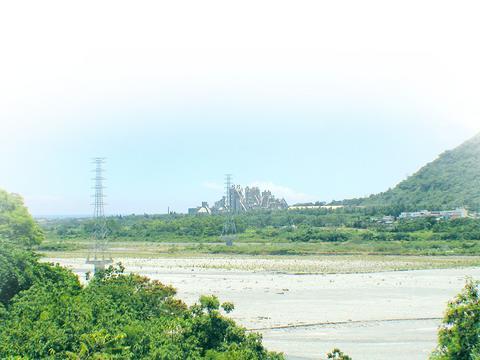
PHOTO: MAX WOODWORTH, TAIPEI TIMES
The graffiti was written by Taroko Aborigine residents of Hsiulin who have been engaged in a bitter, decade-long conflict over land rights at Asia Cement Corp's open-pit mine that has alienated the company from the community, divided the locals and, on one occasion three years ago, erupted in a bloody protest.
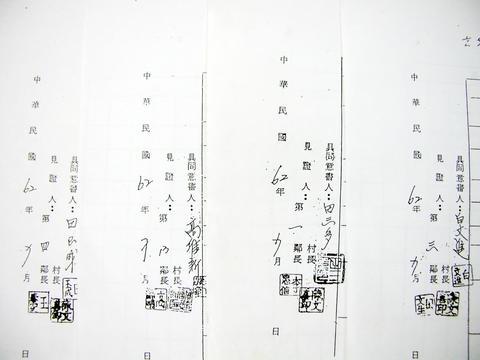
PHOTO: MAX WOODWORTH, TAIPEI TIMES
Since the 2001 action, in which Aborigine landowners attempted to forcibly enter the premises to occupy their plots of land but were rebuffed by mine employees and a company vice president who threatened to kill them "one by one," the company has erected a fence surrounding their operations.
The fence is a physical barrier between the mine and the landowners, but it's also a figurative divide between Tien Chun-chou (
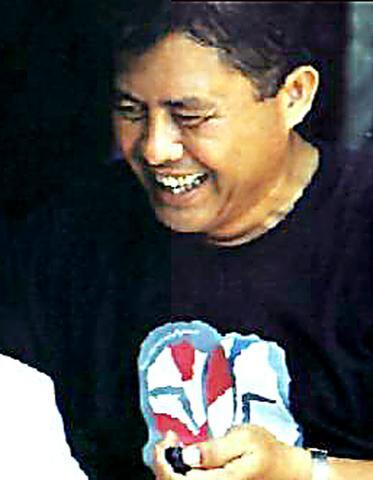
PHOTO COURTESY OF TIEN KUEI-SHIH
The sister is determined to see through the mission of regaining full land rights for the Taroko people who in her words "have been robbed and cheated for 30 years" since the company established operations at Hsiulin. The brother, meanwhile, is exasperated by his divided loyalties between the company and his clan and simply wishes to "retire in peace."
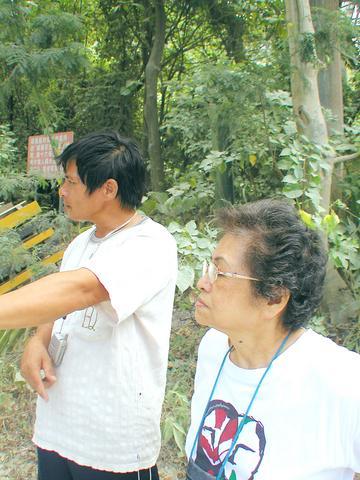
PHOTO: MAX WOODWORTH, TAIPEI TIMES
Troubled roots
The contentious battle between the Taroko and Asia Cement finds its roots back in 1968 and 1969, when the tribespeople, at the time recognized as Atayal Aborigines, registered their land cultivation rights in Hsiulin under a newly established law for the preservation of indigenous peoples" land. That legislation allows for full ownership of the land to be transferred to Aborigines after the land had been cultivated for five years. It also stipulates that land granted to Aborigines for cultivation is non-transferable and non-leasable except to other indigenous persons and under restricted conditions.
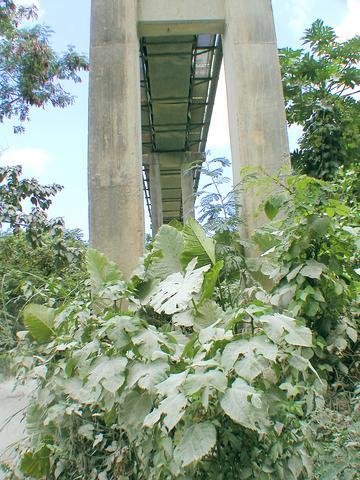
PHOTO: MAX WOODWORTH, TAIPEI TIMES
Nevertheless, beginning in 1972, Han Chinese-owned Asia Cement entered nine-year lease agreements negotiated by the township's administration office for 272 plots of Aborigine land and in the subsequent few years the land rights to all but 61 parcels of land were canceled and handed over to the company under circumstances that activists and legal representatives say are illegal and that should render the company's claims to land use rights invalid.
At the center of Tien Chun Chou's campaign against the mine are strong suspicions that the cancellations of land rights were obtained through forgery. Copies of relevant documents given to Taipei Times show remarkably similar handwriting for signatures by different people signing over the rights to their land. Some lack dates and all lack thumbprints, which are required in the case of a representative signing in lieu of someone who cannot write Chinese. According to Chung Bao-chu (
A decision passed down in 2000 by the Hualien District Court called for Asia Cement to allow onto their land the holders of the cultivation rights of the 61 parcels for which the cultivation rights had not been waived, but the company has so far refused to do so and authorities have thus far failed to enforce the court's decision. The bloody protest in 2001 was an attempt by Tien Chun-chou and landowners to gain access to the plots.
Asia Cement, however, insists that the land rights were obtained legally and the Aborigines" claims to the land are moot. Though over 20 calls this week to company vice president and spokesman Chou Wei-kuen (
The pragmatist and the idealist
It's on this last point that Tien Kuei-shih has settled his accommodation with the mine's presence in Hsiulin. "Before the company came in, everyone complained about how there were no jobs. Now the company's here and everyone wants them gone," he said.
"If you want to develop the land, you need to find a company to put in the investment. It's not as if the residents here have the money to develop the land themselves."
But the benefits to the local community are difficult to determine, particularly in job creation. The company, which allegedly promised to provide Aborigines with jobs, has, in fact, only 20 Aborigine employees out of a workforce of 115 and 15 of these belong to the Amis tribe and are not from Hsiulin. In total, only five landowning Taroko residents of Hsiulin are currently employed at the mine, all at the lowest tier.
Tien Kuei-shih, a high-school graduate, tested into his job 25 years ago and remains at the unskilled-labor pay rank. His Han Chinese colleagues, he said, have been promoted over him for decades.
"If people want the company out of here, it's because they promised to give jobs but didn't deliver. They haven't taken care of the people here. That's their biggest problem," he said.
There are plenty of other problems, though, that his sister points out. First, landowners received as little as NT$3,000 in compensation from the company when it initially obtained the leases and later investigations found that many never received any compensation in the first place. Then there is what she called a high incidence of lung ailments in the township, which she attributes to the suspended dust particles thrown into the air by the mine's TNT-blast digging methods, stone-grinding and delivery processes.
For Tien Chun-chou, Asia Cement's acquisition of the land bears the mark of the central government's all-too-frequent disregard for Aborigines' rights and deep-rooted racist sentiment toward indigenous peoples.
"Han Chinese don't want these facilities in their backyards, so these industries have been moved gradually [to the east coast]. And eventually they'll be moved overseas to poorer countries," she said.
Her claims of racism seem backed up by experience. Indeed, on Thursday, during an inspection of the mine by a group composed of landowners, Commissioner Payan Talu (
Soldiering on
Standing on opposite sides of Asia Cement's fence has given the brother and sister different senses of purpose defined by their experiences and needs.
Tien Chun-chou married a Japanese man and spent much of her life in Tokyo, returning to Hsiulin in 1995 and became involved in the movement against Asia Cement when she happened upon a stack of the company's documents that seemed to confirm many of the landowners' suspicions about malfeasance in obtaining the land rights. Included in these documents are those containing the suspiciously similar signatures waiving land cultivation rights.
Since then, she has been a vociferous critic of the mine and the key organizer of landowners against Asia Cement, a role facilitated by her comfortable retirement that allows her to dedicate herself full-time to the cause. But that isn't to say it's been an easy struggle. She suffered a stroke last year that almost killed her, brought on at least in part by the stress of the case.
"I came here to retire and relax, but it's been more tiring than anything," she said.
Tien Kuei-shih is tired as well. After 25 years, he still performs heavy labor and says he's simply making the best of an imperfect situation.
"I sweat and toil for my money. I earned it and if it's of any consequence, you can say I'm taking it from Han Chinese," he said.
As for the land rights, he says they were probably obtained through crooked methods, but lays responsibility at the feet of the township administration whom he says "stamped all the documents and pocketed all the [compensation] money."
And anyway, he said, he's weary of a fight against the company that will provide him with his retirement benefits within a year. "It's like throwing eggs against a rock," he said.
Those kinds of odds don't seem to bother his sister, and with the local police suffering from a case of inertia in enforcing the Hualien court's 2000 decision, the odds aren't likely to change. Meanwhile, her brother will be privately cheering her on, because the company, he said, has concluded that the Taroko's land reclamation movement is containable, meaning it's a public-relations headache, but not a real threat to its operations.
Were the Taroko to win the case, though, it would be the most significant victory of its kind and a watershed case for other land disputes involving Aboriginal lands and their occupation and development by non-indigenous populations.
If that victory comes, the brother and sister may find ground to return to speaking terms.

On April 26, The Lancet published a letter from two doctors at Taichung-based China Medical University Hospital (CMUH) warning that “Taiwan’s Health Care System is on the Brink of Collapse.” The authors said that “Years of policy inaction and mismanagement of resources have led to the National Health Insurance system operating under unsustainable conditions.” The pushback was immediate. Errors in the paper were quickly identified and publicized, to discredit the authors (the hospital apologized). CNA reported that CMUH said the letter described Taiwan in 2021 as having 62 nurses per 10,000 people, when the correct number was 78 nurses per 10,000

As we live longer, our risk of cognitive impairment is increasing. How can we delay the onset of symptoms? Do we have to give up every indulgence or can small changes make a difference? We asked neurologists for tips on how to keep our brains healthy for life. TAKE CARE OF YOUR HEALTH “All of the sensible things that apply to bodily health apply to brain health,” says Suzanne O’Sullivan, a consultant in neurology at the National Hospital for Neurology and Neurosurgery in London, and the author of The Age of Diagnosis. “When you’re 20, you can get away with absolute

May 5 to May 11 What started out as friction between Taiwanese students at Taichung First High School and a Japanese head cook escalated dramatically over the first two weeks of May 1927. It began on April 30 when the cook’s wife knew that lotus starch used in that night’s dinner had rat feces in it, but failed to inform staff until the meal was already prepared. The students believed that her silence was intentional, and filed a complaint. The school’s Japanese administrators sided with the cook’s family, dismissing the students as troublemakers and clamping down on their freedoms — with

As Donald Trump’s executive order in March led to the shuttering of Voice of America (VOA) — the global broadcaster whose roots date back to the fight against Nazi propaganda — he quickly attracted support from figures not used to aligning themselves with any US administration. Trump had ordered the US Agency for Global Media, the federal agency that funds VOA and other groups promoting independent journalism overseas, to be “eliminated to the maximum extent consistent with applicable law.” The decision suddenly halted programming in 49 languages to more than 425 million people. In Moscow, Margarita Simonyan, the hardline editor-in-chief of the